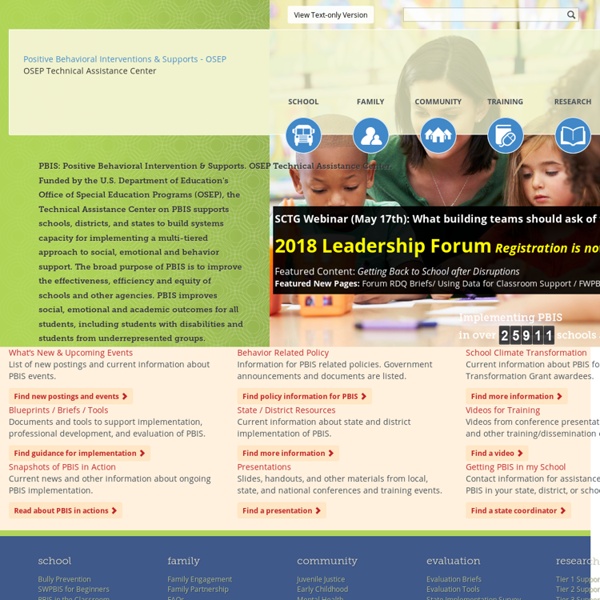



National Research Center on Learning Disabilities (NRCLD) School Violence and youth: Psychology’s response This summary report by the American Psychological Association's Commission on Violence and Youth examines individual and societal factors that contribute to youth violence in the United States and offers intervention strategies to reduce such violence. It examines biological, family, school, emotional, cognitive, social, and cultural factors which contribute to violent behavior. The report reviews what psychologists have learned about the factors that accompany and contribute to youth violence. Applying Behavior Analysis to School Violence and Discipline Problems: School-Wide Positive Behavior Support School discipline is a growing concern in the United States. Best practices in school discipline A book chapter from the book 'Best Practices in School Psychology-II.' First Step to Success: An early intervention for elementary children at risk for antisocial behavior Positive behavior support. Functional communication training with toddlers
Office of Special Education Programs (OSEP) - Home Page The Office of Special Education Programs (OSEP) is dedicated to improving results for infants, toddlers, children and youth with disabilities ages birth through 21 by providing leadership and financial support to assist states and local districts. The Individuals with Disabilities Education Act of 2004 (IDEA) authorizes formula grants to states and discretionary grants to institutions of higher education and other non-profit organizations to support research, demonstrations, technical assistance and dissemination, technology and personnel development and parent-training and information centers. To learn more about OSEP, click on the relevant links below.
Firefox Web Browser — Getting Started with Mozilla Firefox — mozilla.org Welcome to Firefox! We'll show you all the basics to get you up and running. When you're ready to go beyond the basics, check out the other links for features you can explore later. By default, Firefox gives you access to great content every time you open a new tab. Customize this page by hovering over the sections and thumbnails or click the gear icon for more options. Whether you know the exact web address or you're just searching, Firefox's address bar handles it all. Found a great web page? Browse the Internet without saving any information on your computer about which sites and pages you’ve visited. Click the menu button and then click New Private Window. Set up Firefox Accounts so you can take your browsing information with you wherever you go. , choose Sign in to Sync and follow the instructions to create your account. Choose the page that opens when you start Firefox or click the Home button. Open a tab with the web page you want to use as your home page.
Wrightslaw Special Education Law and Advocacy ProjectForum.org Association québécoise des troubles d'apprentissage - AQETA Missouri Schoolwide Positive Behavior Support
Great site for State Educational Agencies and Local Educational Agencies accessing materials to start PBIS! by ccsanyi Oct 4